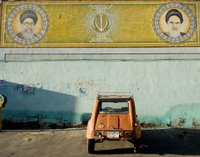
True to reputation, the Iranians are proving to be uncommonly friendly. Several times in Mako I am stopped in the street and welcomed to Iran. There’s always a firm handshake and an enquiry after my health and place of origin. They’ve all heard of Scotland. “Aah! Escotte-land.” they say and nod. It appears we are famous for two things: whisky and Celtic Football Club.
On the drive south I fill up about every two hundred kilometres. It costs about $1 US. As I arrive at each petrol station a small crowd gathers, welcomes me to Iran and finds out I’m Scottish and in good health. As I leave a small knot of men grins and waves goodbye, shouting “Goodbye! You are welcome! Thank you!”
In Mirjaveh I get lost. I know just one thing about Mirjaveh: it has only one hotel. For about half an hour I ride around, realising I am never going to find it by pot luck. As I sit at a junction wondering what to do, four boys on two diminutive Hondas pull up.
“Hello.” I grin. “I am from Scotland, very well thank you and cannot find a hotel.”
They offer to show me the way. At about ten miles an hour we cruise sedately through the town in the setting sun. It’s a very ordinary town of little shops and tree shaded pavements. Respectable looking men with straight backs and steel grey hair walk purposefully through the milling crowds of howdahs. It’s the end of the day and the people are out in large numbers, shopping, socialising, and getting on with life. It’s an atmosphere curiously at odds with the red sun settling into the western horizon, lighting the swirls of wind blown dust that occasionally rush like wraiths across the road. Here in the centre, life is modern and prosperous, but the wild, mountainous desert lies right at the edge of town.
At my hotel, the boys queue up to shake hands and then grinning and waving, shout their goodbyes; roaring off into the sunset barely above walking speed.
In Qazvin, a little over 300km further to the south and east, it continues. In a shop, I collect together some snacks to see me through the evening. Among them is some processed cheese that proudly proclaims itself to be “55% Fat in Dry Matter,” and some alcohol free beer, intriguingly labelled “Apple Flavour.” The shopkeeper, as has become expected, welcomes me to Iran with all the usual pleasantries. Then he leans forward conspiratorially,
“What do you think of our government?”
Hmmm. A tricky one.
“I think all politicians are crazy.”
He straightens up and looks out of the window a little sadly,
“We do not like our government. They do such stupid things.”
“Mine too.” I answer inadequately.
Suddenly he brightens up and waves dismissively at my bag of snacks,
“You are our guest. You do not have to pay.”
But I insist and eventually he takes a suspiciously small sum of money for my bulging bag of fat in dry matter and bizarre tasting beer.
It’s not until I’m well south of Tehran that I hear the news. A few days previously, twelve people had been shot dead on the road between Kerman and Zahedan. A ‘considerable escalation in violence’ is making the province of Baluchistan into a no go zone. Local tribes have effectively waged war on the Iranian government on the only road between Iran and Pakistan. Indeed, the only road between the middle east and the sub-continent.
It is one of the hardest decisions I have ever had to make. A fourteen year dream is being threatened with a premature end.
The difficulty is that I have no experience of this kind of risk. Put me on a leeward mountainside with a fresh fall of windblown snow and I can give you a rough estimate of how likely that slope is to avalanche while I cross it. Put me on the same mountain in a blizzard and I would, in most circumstances, be equipped to extricate myself from the situation. Right now, here in the South East of Iran, I have absolutely no idea what the odds are on getting shot on the Kerman/Zahedan road. Is it one in a thousand? Perhaps it’s one in ten? Fifty-fifty? And should I be presented with an angry tribesman waving a Kalashnikov I would have no idea how to get out of that situation.
With no way of evaluating the risks I need expert advice. I phone the British embassy in Tehran and their advice is clear: The whole area is extremely volatile right now, people are being killed, tourists have previously been singled out as targets for kidnapping , with British tourists being especially vulnerable. As I am 100% of the tourists I have seen in Iran I’m not particularly liking the odds. In the end it is pretty unequivocal: “Tourists should not travel overland between Iran and Pakistan.” As ignorant as I am, I decide it would be criminally irresponsible to ignore the experts. Live to ride another day. Live to ride West.
The following morning a hot wind blows through the vents in my jacket and I can feel the dust gumming my eyes and drying my lips. The white sun seems to fill the sky and the world is polished and painfully bright. The way is filled with short snatches of scent; burning wood and diesel, dry soil and chemical fertilizer; the sudden rushing aroma of vegetation in the cool wind over a river. And always the steady drumming of the engine and the rattle of crippled aluminium luggage; then suddenly, the rich, throaty growl as I drop a gear and push past a line of trucks.
From inside my helmet, battered by the slipstream for fourteen thousand kilometres, I watch the passing landscape strangely disconnected. This road is no longer my road. It’s just the way home.
THE END





